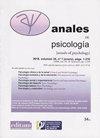Creativity as a "vaccine" for depressed mood: coping and divergent thinking in young adults
IF 1.3
4区 心理学
Q3 PSYCHOLOGY
引用次数: 6
Abstract
The depressed mood has more and more presence in our current society. It is urgent to explore ways not only to deal with depressed mood but also to prevent it. Divergent thinking could be useful in such prevention. Certain coping strategies could mediate the relationship between divergent thinking and depressed mood. Two are the most feasible ways of connection: active problem-focused coping (like problem-solving or positive reappraisal strategies) and decreasing the odds of emotion-focused coping (like negative self-focused coping strategies). The objective of this study is to test a theoretical model that establishes the indirect relationship of divergent thinking on depressed mood. Participants were 135 subjects with ages ranging between 18 and 25 years old. The statistical analysis included structural equations modeling. The initial model led to a final model endorsed by the goodness of fit. Comparative Fit Indices for this model were: CFI = .951, GFI = .960, RMSEA = .067. This model supports a positive relationship between divergent thinking and positive reappraisal and a negative link between this kind of thinking and negative self-focused coping. Both coping strategies are connected to depressed mood. Divergent thinking can facilitate a positive reappraisal that helps to widen youngers’ repertoire of options. It can also reduce the probability of focusing on immediate and uncontrolled emotional expression, feelings of helplessness, and resignation. In one form or another, divergent thinking can promote coping strategies that can serve as a prophylaxis for hopelessness in young adults that is generally related to depressed mood. El estado de ánimo deprimido es cada vez más frecuente en nuestra sociedad. Es urgente no solo explorar cómo tratar este problema sino, sobre todo, cómo prevenirlo. El pensamiento divergente puede ser útil para esa prevención. La relación entre el pensamiento divergente y el estado de ánimo depresivo en adultos jóvenes podría estar mediada por las estrategias de afrontamiento. Dos podrían ser las formas más factibles de conexión: un afrontamiento activo centrado en el problema (como la resolución de problemas o estrategias de reevaluación positivas) y la erradicación de un afrontamiento centrado en las emociones (como las estrategias de afrontamiento negativas centradas en uno mismo). El objetivo de este estudio es probar un modelo teórico que establece una relación indirecta del pensamiento divergente sobre el estado de ánimo depresivo. Los participantes fueron 135 sujetos con edades comprendidas entre los 18 y los 25 años. El análisis estadístico incluyó un modelo de ecuaciones estructurales. Los índices de ajuste para este modelo fueron: CFI = .951, GFI = .960, RMSEA = .067. El modelo inicial condujo a uno final avalado por su bondad del ajuste. Este modelo confirma una relación positiva entre pensamiento divergente y reevaluación positiva y un vínculo negativo entre este tipo de pensamiento y la autofocalización negativa. Ambas estrategias de afrontamiento están relacionadas con el estado de ánimo deprimido. El pensamiento divergente puede facilitar una reevaluación positiva que ayude a ampliar el repertorio de opciones en los jóvenes. También puede reducir la probabilidad de centrarse en la expresión emocional inmediata y descontrolada, los sentimientos de impotencia y resignación. De una forma u otra, el pensamiento divergente puede promover estrategias de afrontamiento que pueden servir como profilaxis para la desesperanza en adultos jóvenes que generalmente está relacionada con el estado de ánimo depresivo.创造力作为抑郁情绪的“疫苗”:年轻人的应对和发散思维
抑郁情绪在当今社会越来越普遍。因此,迫切需要探索治疗和预防抑郁情绪的方法。发散性思维可能有助于这种预防。某些应对策略可以调节发散思维与抑郁情绪之间的关系。两种是最可行的联系方式:积极的以问题为中心的应对(如解决问题或积极的重新评估策略)和减少以情绪为中心的应对(如消极的以自我为中心的应对策略)的几率。本研究的目的是检验一个建立发散思维与抑郁情绪间接关系的理论模型。参与者有135人,年龄在18到25岁之间。统计分析包括结构方程建模。最初的模型得到了最终的模型,该模型得到了拟合优度的认可。模型的比较拟合指数为:CFI = .951, GFI = .960, RMSEA = .067。该模型支持发散思维与积极的再评价之间存在正相关关系,而这种思维与消极的自我关注应对之间存在负相关关系。这两种应对策略都与抑郁情绪有关。发散性思维可以促进积极的重新评估,这有助于扩大年轻人的选择范围。它还可以减少关注即时和不受控制的情绪表达、无助感和辞职的可能性。以这样或那样的形式,发散性思维可以促进应对策略,这种策略可以预防年轻人的绝望情绪,而绝望情绪通常与抑郁情绪有关。El estado de ánimo desmido es cadas vez más freente en nustra sociedad。他迫切没有独自探索cómo性格的问题,严肃地做,cómo预防。El pensamiento divergente puede ser útil para esa prevención。relación研究中心与ánimo成人抑郁症研究中心的差异jóvenes podría研究中心与环境战略研究中心的差异。Dos podrían ser las formas más factibles de conexión: unafrontamiento activo centrado en el problema (como la resolución de problemas o strategias de reevaluación positivas)和la erradicación de unrontamiento centrado en las emociones (como las strategias de afronitiento negativas centradas en uno mismo)。我们的目标是建立一个模型:teórico建立一个模型,建立一个模型:relación间接建立一个模型,建立一个模型:不同的模型,建立一个模型:ánimo抑郁症。共有135名参与者参加了本次研究,他们的研究对象包括:研究对象18 - 25 años。El análisis estadístico incluyó unmodelo de ecuaciones strucales。Los índices de ajuste para este modelo fueron: CFI = .951, GFI = .960, RMSEA = .067。El模型的初始孔道是一个不确定的最终数值,它是一个不确定的数值。Este模型证实:relación正中心pensamiento发散,reevaluación正中心pensamiento发散,vínculo负中心pensamiento发散,autofocalización负中心pensamiento发散,reevaluación负中心pensamiento发散,autofocalización负中心pensamiento发散。大使对están关系的环境战略和对ánimo关系的环境战略。《意见的分歧和便利》reevaluación积极地拟订了《意见的分歧和便利》jóvenes。tamambisamicenpuede降低了中心化的可能性,在失控的情况下,expresión情绪直接,失去了阳痿的感觉resignación。1 .从形式上看,从纵向上看,从纵向上看,从纵向上看,从纵向上看,从纵向上看,从纵向上看,从纵向上看,从纵向上看,从纵向上看,从纵向上看,从纵向上看,从纵向上看,从纵向上看,从纵向上看,从纵向上看,从纵向上看,从纵向上看,从纵向上看,从纵向上看,从纵向上看,从纵向上看,从纵向上看,从纵向上看。
本文章由计算机程序翻译,如有差异,请以英文原文为准。
求助全文
约1分钟内获得全文
求助全文
来源期刊

Anales De Psicologia
医学-心理学
CiteScore
3.30
自引率
5.90%
发文量
57
审稿时长
4-8 weeks
期刊介绍:
Anales de Psicologia / Annals of Psychology is a multidisciplinary journal of the various thematic areas of scientific psychology. It publishes original research articles and theoretical review in any of its basic, applied and methodological areas included within psychology.
Publishing, financing, marketing and distribution corresponds Editum: Editions of the University of Murcia (Spain). The organizational guidelines and editorial policies come from the Editorial Team (elected for four years by the Areas and / or Departments of Psychology at the University of Murcia) and the Editorial Board, composed of scholars and experts from different universities and institutions national and international. It is published in print (ISSN: 0212-9728) since 1984 and in Internet publishing (web) (ISSN: 1695-2294) since 2000. Available online full text in pdf from the vol. 1 1984.
Anales de Psicologia / Annals of Psychology maintains a system of exchange with other journals and publications of psychology in the world. Through an free exchange agreement with their respective publishers or entities responsible for editing, these journals and publications are received at the University of Murcia (Biblioteca "Luis Vives", near the Faculty of Psychology) and in return, our journal is sent to libraries and educational and research institutions such centers responsible for editing.
 求助内容:
求助内容: 应助结果提醒方式:
应助结果提醒方式:


